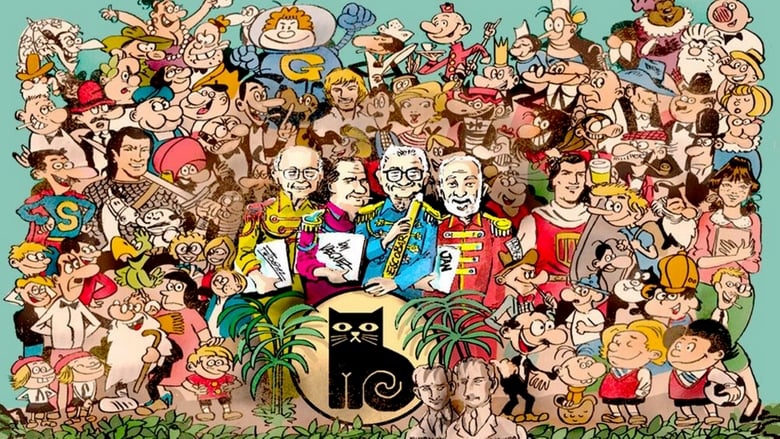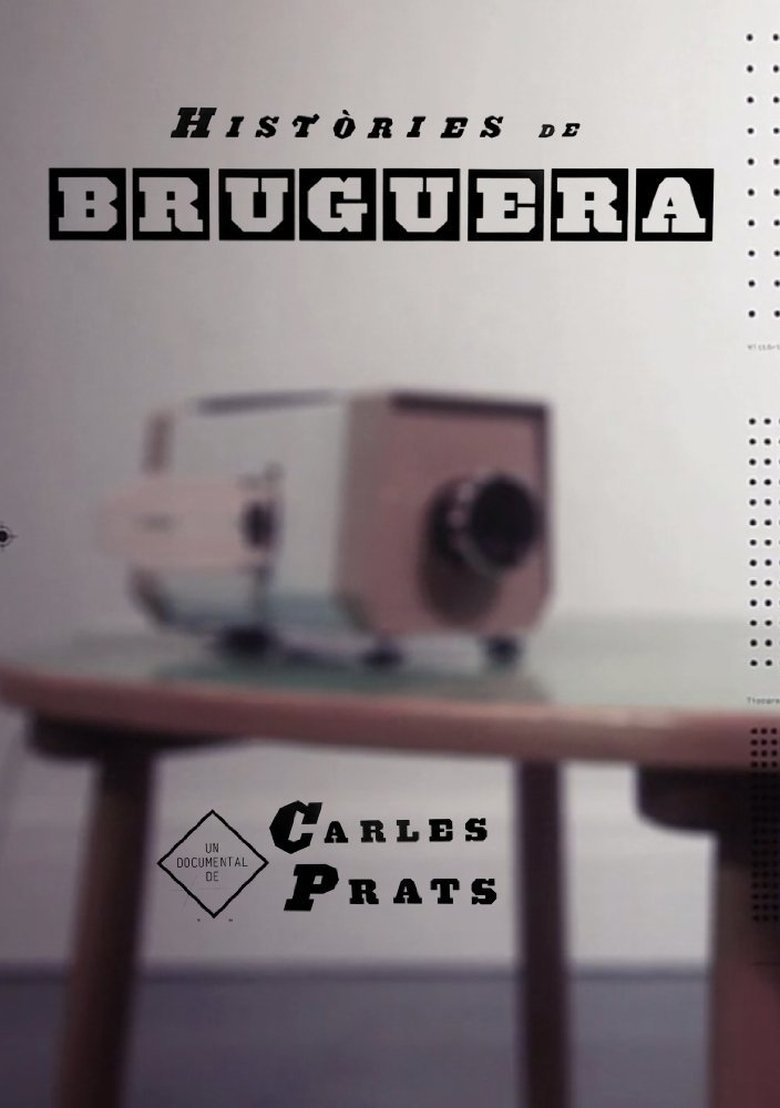Loading


Històries de Bruguera
Genres
Documentary
Overview
The history of Bruguera, the most important comic publisher in Spain between the 1940s and the 1980s. How the characters created by great writers and pencilers became Spanish archetypes and how their strips persist nowadays as a portrait of Spain and its people. The daily life of the creators and the founding family, the Brugueras. The world in which hundreds of vivid colorful paper beings lived and still live, in the memory of millions, in the smile of everyone.
Details
Budget
$0
Revenue
$0
Runtime
80 min
Release Date
2012-04-20
Status
Released
Original Language
Spanish
Vote Count
1
Vote Average
6
Cast
Meet the talented actors who bring the movie to life.
Amèlia Bruguera
Herself
Andreu Martín
Himself
Antoni Guiral
Himself
Antònia Bruguera
Herself
Carles Santamaría
Himself
Consol Bruguera
Herself
Enric de Manuel
Himself
Enric Larreula
Himself
Guillem Cifré
Himself
Jesús de Cos
Himself
Jesús Durán
Himself
Joan Bruguera
Himself
Joan Navarro
Himself
Jordi Bernet
Himself
Joso
Himself
Manuel de Cos
Himself
Miguel Fuster
Himself
Óscar Aibar
Himself
Paco Ortega
Himself
Purita Campos
Herself
Salvador Roselló
Himself
Vicent Palomares
Himself
Vicent Sanchis
Himself
Xavi Franch
Himself
Jordi Bayona
Himself
Similar Movies
Explore movies similar to this one that you might also enjoy.
7.5
Hands on a Hardbody: The Documentary
Filmmaker S.R. Bindler profiles Texas contestants trying to win a truck by keeping one hand on it longer than everyone else.
1997-06-01 | en
0.0
The Invisible Half: Luis García Berlanga's The Executioner
Documentary about Spanish director Luis García Berlanga's "The Executioner" (1963)
2012-02-25 | es
7.0
I Invite You to My Execution
As Russian writer Boris Pasternak (1890-1960) thinks it is impossible that his novel Doctor Zhivago is published in the Soviet Union, because it supposedly shows a critical view of the October Revolution, he decides to smuggle several copies of the manuscript out of the country. It is first published in 1957 in Italia and the author receives the Nobel Prize in Literature in 1958, which has consequences.
2019-10-30 | fr
6.3
Two Headed Cow
Documentary - Eighteen years in the making, two-headed cow started off as a black and white film that followed Dexter Romweber and his drummer Crow on a rock and roll tour along the same route as General Sherman. The film was not finished due to many circumstances, but the filmmakers were able to resume the film seventeen years later. After major TV appearances, a stint on a major label, bouts of depression and drug addiction, the film took on a different tone and poignancy. - Neko Case, Exene Cervenka, LaResh Crash
2006-04-08 | en
7.1
The Beksińskis. A Sound and Picture Album
Painter Zdzisław Beksiński, his wife Zofia and their son Tomasz, a well-known radio journalist and translator, were a typical and unconventional family, both at the same time. One of the father’s obsessions was filming himself and his family members. Using archival footage only, shot primarily by Zdzisław, as well many other materials, which have not been presented anywhere so far, the film tells a tragic story of the Beksińskis that has never ceased to fascinate Polish filmmakers.
2017-05-28 | pl
0.0
Le Théâtre National Populaire
The T.N.P., the Théâtre National Populaire, an important experimental theater directed by Jean Vilar. Franju combines sequences from theatrical performances with documentary images, creating links and confrontations between theater and the real world.
1956-06-08 | fr
0.0
The General And Me
Over the period of 25 years the director met General Võ Nguyên Giáp, a legendary hero of Vietnam’s independence wars, a number of times. She was the first American who entered the home of the “Red Napoleon”. The fruit of this friendship is a film, personal and politically involved at the same time. Travelling across the country and talking to important figures as well as ordinary people, the director finds out more about her roots and offers the audience a unique perspective on Vietnam’s present and past.
2017-05-29 | en
10.0
Leonora Carrington or The Ironic Spell
Cinema and painting establish a fluid dialogue and begins with introspection in the themes and forms of the plastic work of a woman tormented by the elongated specters, originating from her obsessions and nightmares.
1965-02-09 | es
8.0
Taylor Swift: From the Heart
After having released her fourth album "Red" in October 2012, Taylor Alison Swift continues to tear up the charts. In this film we learn how Swift becomes one of America's biggest Country and Pop music artists.
2013-04-01 | en
0.0
Stitched: The Film
"Stitched" is a fun-filled documentary following three quilters racing to complete their entries for the International Quilt Festival, the largest and most competitive quilt show in the nation. Judged on a combination of craftsmanship and flair, traditionalists compete with newcomers as the competition features heated battles between hand and machine quilters, and a controversial painted nude piece that sparks debate.
2013-01-01 | en
0.0
So I Sleepwalk in Broad Daylight
In Garcia Lorca's mother tongue, death is a woman: "la muerte". Daniel slips into the role of "death as a female" and speaks before a video camera on the life and death of the famous Spanish poet. Then the story begins.
1994-01-01 | de
5.0
Vieiros, vida y obra de Carlos Velo
2000-06-09 | es
6.0
Polanski y los ojos del mal
Documentary that describes and analyzes the characteristics, themes and central concerns of Roman Polanski's cinema.
2002-04-16 | es
0.0
Le temps des amoureuses
2008-07-04 | fr
6.7
Africa, Blood & Beauty
This film speaks of archaic peoples, their customs and mores, in an attempt to make the last snapshots of their traditional lifestyles before they are gone for good.
2012-01-04 | fr
5.7
The White World According to Daliborek
Dalibor K. is an industrial painter, amateur horror maker, the composer of angry songs, painter and a radical neo-Nazi. He is approaching 40, but he is still living with his mother Vera, Aged 63, and is yet to experience the real relationship with a woman. He hates his job, gypsies, Jews, refugees, homosexuals, Merkel, spiders and dentists. He hates his life, but he doesn’t know how to change it.
2017-07-13 | cs
8.0
Memoirs of a Spectrum Addict
Memoirs of a Spectrum Addict is a full length documentary feature film which takes a detailed look at the ZX Spectrum, its history, developers, games and fans. The film is a unique tribute to the Sinclair ZX Spectrum. Memoirs of a Spectrum Addict has re-enactments, interviews like you’ve never seen before with major Spectrum industry figures, and features real people who grew up influenced by the Sinclair ZX Spectrum!
2017-07-01 | en
10.0
Spotlight on Merna
Taking part in The Voice Kids is already quite something, but for 11-year-old Merna it’s really something special. Her parents had to flee Iraq because they are part of the Christian minority, and IS was threatening to kidnap Merna. They now live in Lebanon, where one in three people is a refugee. The family has been waiting for two years for permission to move on. FaceTiming with her older sister, who stayed behind in Iraq, and cooking her favorite dishes with her mother make the situation more bearable. But what also really helps is singing – this calms Merna and makes her less afraid. She used to sing only in church, but since The Voice her beautiful, melancholy voice touches everyone. Because of her status as a refugee, Merna isn’t allowed to attend the foreign performances with the other finalists, but she’s now a national celebrity in Lebanon.
2016-11-17 | en
0.0
The Medal of Honor: The Stories of Our Nation's Most Celebrated Heroes
The Medal of Honor is awarded for conspicuous gallantry and intrepidity at the risk of his or her life above and beyond the call of duty while engaged in an action against an enemy of the United States. This 6-part documentary chronicles the highest award given to military personnel for their extreme bravery, valor and harrowing sacrifices. Covering the Civil War through the wars in Iraq and Afghanistan, learn about the most courageous acts performed by the people who fight for American freedom. These are their stories...
2012-04-03 | en
6.4
Barão Vermelho: Por que a gente é assim?
A documentary about Barão Vermelho, one of Brazil's most famous rock bands during the 1980s, following its steps through archive footage and interviews with all of its remaining members and associated parties.
2017-05-08 | pt